Jul 20, 2025 – Jungto Society Planning Committee Workshop, Standing 1000-Day Preparation Committee Meeting
Hello. Today, Sunim is scheduled to attend the Planning Committee Workshop and the Standing 1000-Day Preparation Committee Meeting, where core leaders of Jungto Society will participate.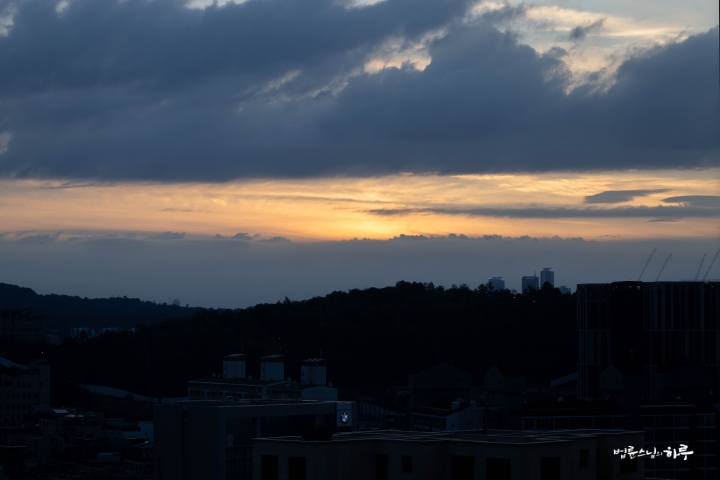
After completing morning practice and meditation, Sunim attended the Jungto Society Planning Committee Workshop held in the 9th floor auditorium starting at 9:30 AM. The planning committee members conducted an in-depth discussion over two days and one night, evaluating the planning committee’s activities and discussing future operational plans. Today, they decided to have time with Venerable Pomnyun Sunim, the guiding Dharma teacher of Jungto Society, to resolve questions that arose during the discussion process.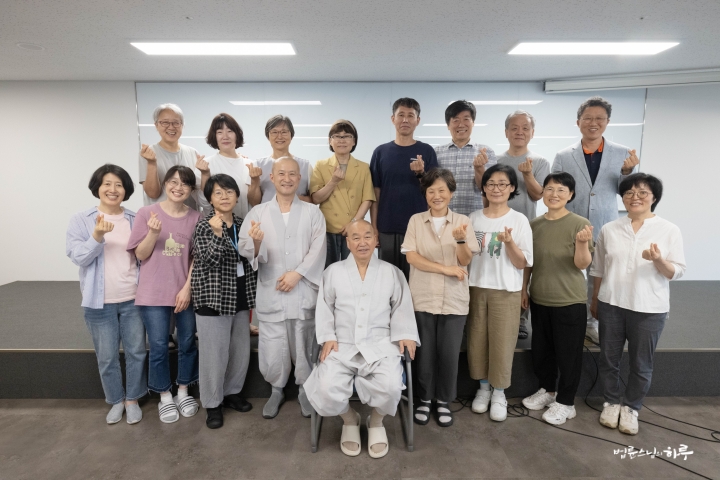
First, Dharma Teacher Hyangsang presented a summary of the content discussed by the planning committee members throughout yesterday. Dharma Teacher Hyangsang stated, “The planning committee has lacked the function of establishing mid- to long-term strategies,” pointing out decreased focus due to concurrent positions, lack of role awareness within the committee, and difficulties in personnel composition as causes. The lack of discussion on policy direction related to online Buddhist services was also mentioned as a problem.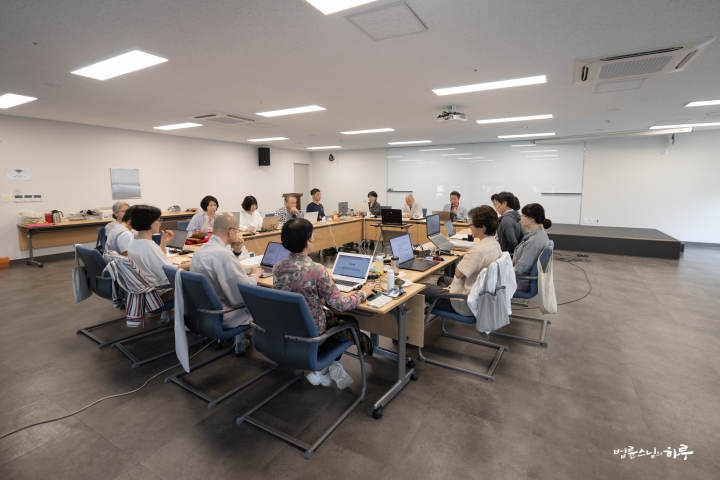
The planning committee presented specific measures to strengthen planning functions in line with the next 1000-Day Practice period. Various proposals were discussed, including establishing a dedicated organization called the “Planning Office” to handle core tasks such as Jungto Society’s mid- to long-term strategy, social strategy, online organizational model, and integrated public relations, and transferring the planning committee’s divisional functions under the Gyeolsa Practitioners’ Meeting. Securing personnel was identified as an ongoing challenge. Therefore, an open-style planning committee operation that could gather fresh ideas from more Jungto Society members was also proposed.

After listening to the planning committee members’ discussion, Sunim also shared several opinions.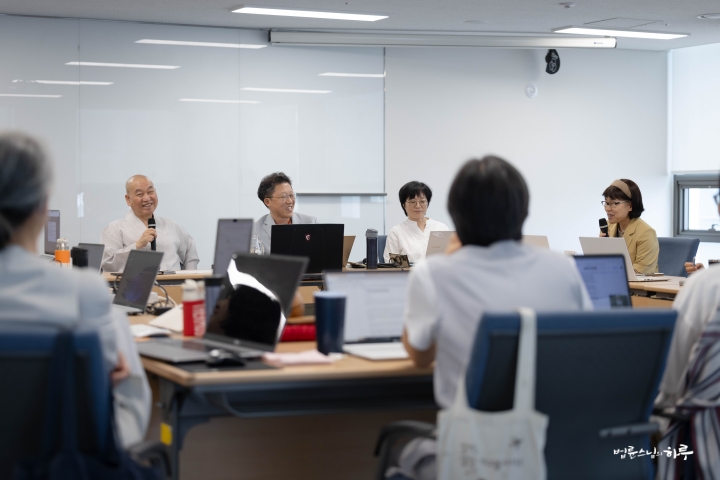
How Should Leadership Transition for Jungto Society’s Sustainability?
“Actually, I intended to step back from Jungto Society operations starting from the second 10,000-Day Practice. While I supported the first 1000-Day Practice by giving the 100-Day Dharma Talk, I didn’t participate in the planning committee or Gyeolsa Practitioners’ meetings. The reason is that since I have a lot of information and experience, my opinions naturally tend to become central when I participate in meetings. No matter how much authority is distributed, I ultimately end up leading in practice, so I decided not to participate in meetings at all. As a result, it’s true that there hasn’t been much progress over the past three years. However, I think this is also an inevitable process we must go through when leadership changes. So some people have suggested this:
‘If Sunim weren’t here, we would take responsibility and do it, but since Sunim is here, it’s actually difficult for us to take responsibility and make decisions. Rather, we suggest that Sunim take the lead in making decisions now, and we’ll take over after you pass away.’ 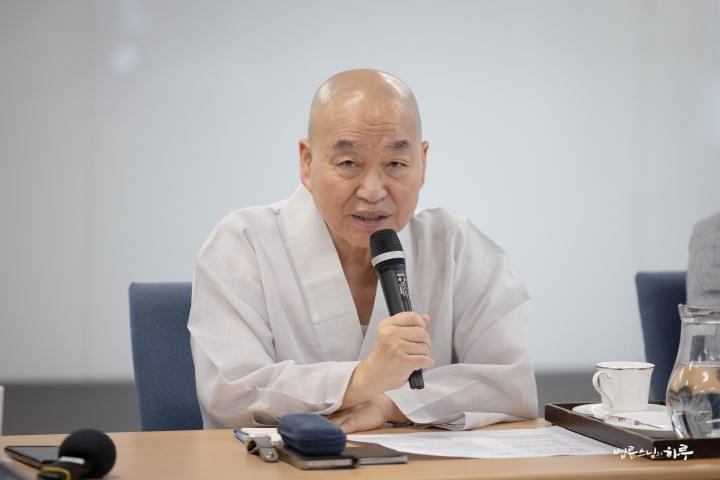
Of course, that could be one approach. However, I think it would be more helpful for Jungto Society’s development if I could provide some advice while still alive. From this perspective, I would like to significantly reduce my involvement starting from the 2-2 1000-Day Practice.
Jungto Society’s Unfinished Tasks and Preparation for Generational Change
These days people talk about living to 100, but the age difference between you and me is only about 10 years. The time you can actually work effectively is probably about 10 more years. Your health is already declining. You too should now be planning to pass things on to the next generation. You should prepare to work for another 10 years, while I think I should start wrapping things up now.
Nevertheless, I believe I still have a role to play in two areas. One is inter-Korean relations. As a social elder, and in the current situation, I think I can have some influence. The other is overseas development. Since Venerable Pomnyun Sunim’s activities are just beginning to be known abroad, I think my involvement for about the next five years will help with business expansion and establishment. Except for these two areas, I think it would be better for Venerable Pomnyun Sunim to step back from the front lines in most areas. 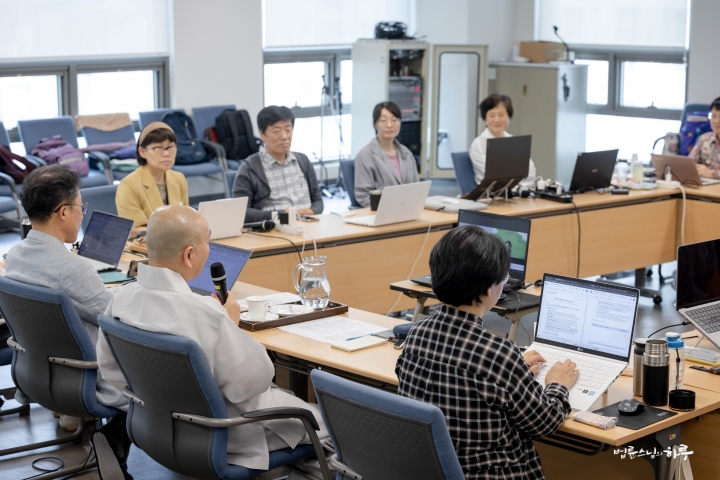
Looking back on the past 2-1st 1000-Day Practice, several regrettable points remain. First, for Jungto Society activities to achieve greater completeness, pioneering in the agricultural sector must be pursued alongside environmental movements. Although there was an attempt to focus on the agricultural sector for five years starting in 2020, the somewhat early conclusion of the COVID-19 pandemic has resulted in the near suspension of agricultural pioneering efforts. Second, it is necessary to establish elderly welfare facilities and educational and training facilities that encompass all generations, including alternative education for children. This project has been planned for 30 years, but a proper system has not yet been established. Third, a meditation center that combines walking and meditation is needed. Mungyeong Jungto Retreat Center has difficulties operating as a meditation center due to its location and terrain, and Seonyudong Education and Training Center is only serving a temporary role. In the long term, a new central space that can serve as a spiritual cradle for Jungto Society members needs to be established. This will be a task for you to solve in the future, and I think it would be good for me to gradually wrap up my activities from now on.”
This workshop was not merely an evaluation session but a venue for substantial discussions aimed at comprehensively reorganizing the functions of the Planning Committee. After a Q&A session with Sunim until noon, the morning session concluded.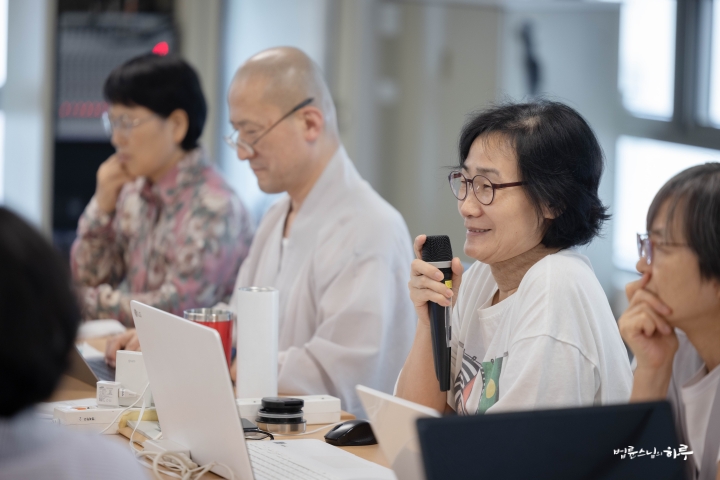
Marking the beginning of the three hottest days of summer with Chobok (the first day), the temperature rose to 35 degrees Celsius, and the heat wave was in full swing. After lunch, Sunim attended to work at the Peace Foundation office.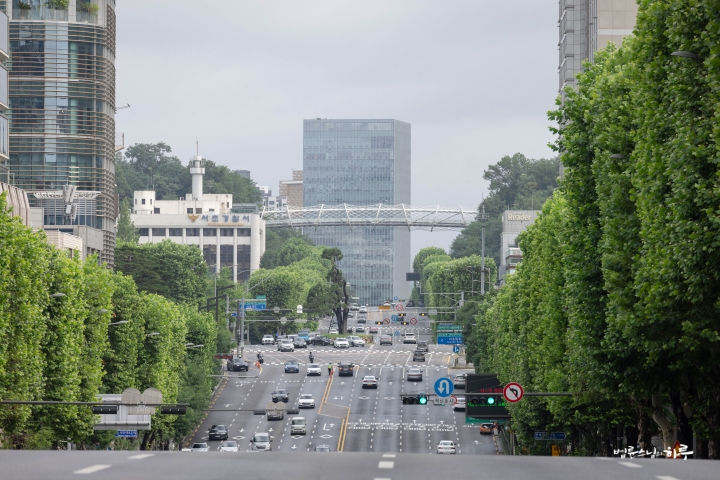
In the afternoon session, the planning committee members continued more in-depth discussions on how to specifically organize and divide roles for the future planning office.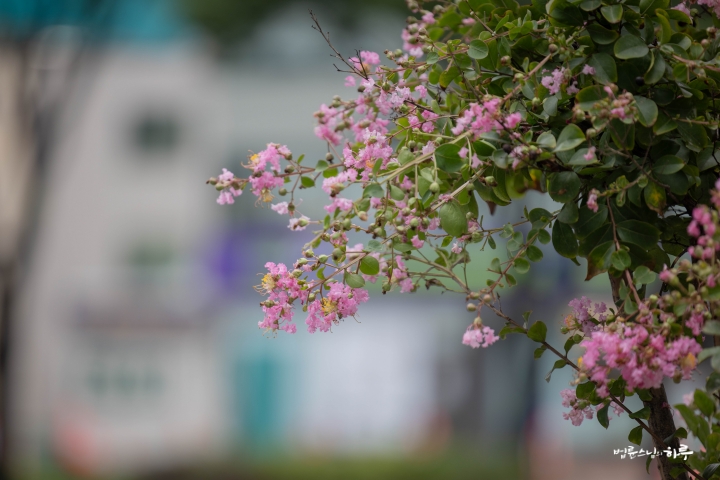
From 3 PM, Sunim held a meeting with the Jungto Society Standing 1000-Day Preparatory Committee in the Peace Foundation conference room. The committee members presented their discussions from the first half of the year regarding the business direction and goals for Jungto Society’s 2-2nd 1000-Day Practice, organizational restructuring plans, branch operation methods, membership system improvements, and the proposal for establishing the Happiness Education Center, seeking Sunim’s advice.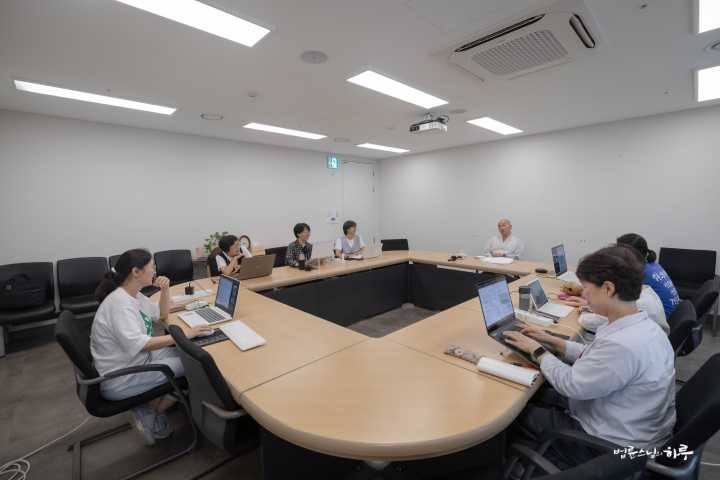
After two hours of questions and listening to Sunim’s opinions, the meeting concluded at 5 PM.
“Since everyone has worked hard, let’s have dinner together today.” 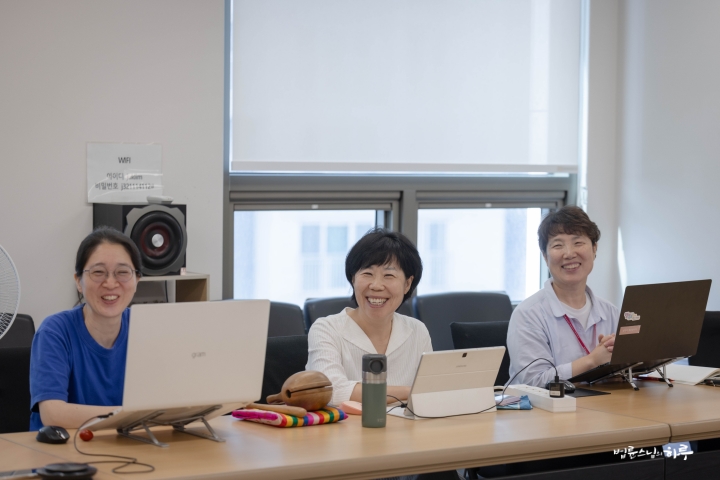
Everyone moved to the restaurant and had dinner together. Sunim encouraged the 1000-Day Preparatory Committee members who had worked hard during the first half of the year and the planning committee members who had been in charge of each division for the past two years.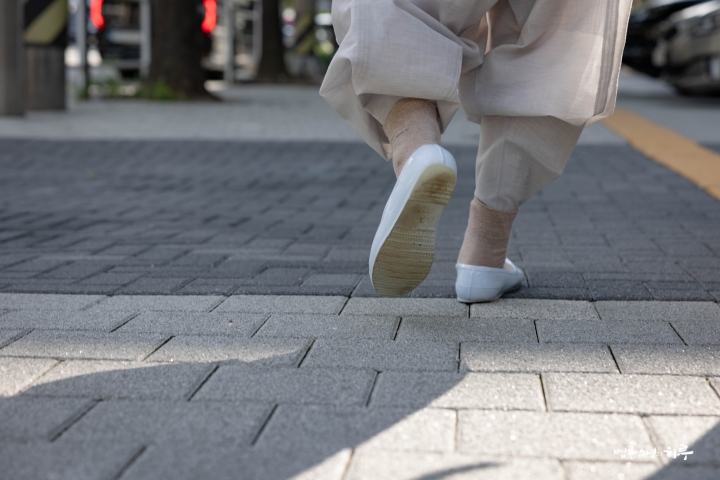
After sunset, Sunim spent the evening reviewing manuscripts and handling some tasks indoors before wrapping up the day.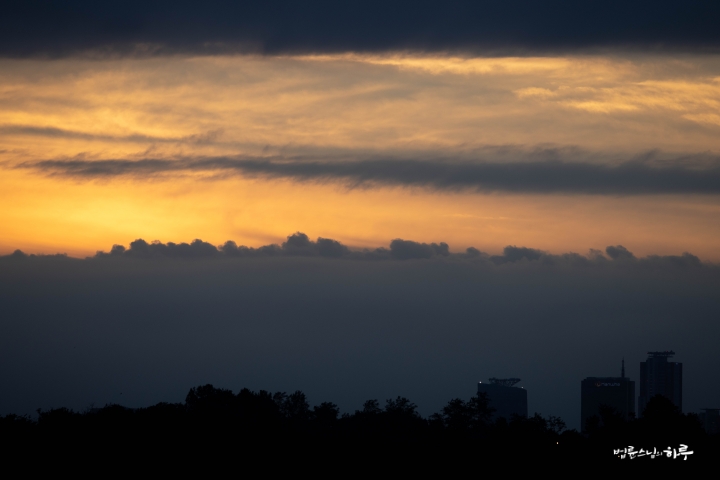
Since there was no Dharma talk today, I’ll conclude this article by sharing a conversation between Sunim and a questioner from the Friday Dharma Q&A held at the Jungto Social and Cultural Center the day before yesterday.
How Can I Live Freely Despite Childhood Trauma and Deep Distrust?
“I started hospital treatment about three weeks ago.”
“That’s good. However, taking medication doesn’t lead to immediate improvement. You might experience severe drowsiness or feel foggy, and when that happens, you need to consult with your doctor to adjust the medication. If anger or hatred doesn’t subside even while taking medication, you may need to change the medication or adjust the dosage again. Medications inevitably come with side effects. Just as wearing a cast for a broken leg makes walking uncomfortable, taking medication may reduce delusions but can create other symptoms like drowsiness or lethargy. For example, if you take medication for a skin condition, your skin may improve, but your liver function might deteriorate slightly. Such minor side effects are unavoidable. In such cases, you need to decide whether to prioritize skin recovery or liver function protection. If skin is more important, you must accept the strain on your liver; if the liver is more important, you should stop the medication despite the skin discomfort. We can only live by constantly judging what to prioritize and accepting discomfort. So taking medication doesn’t mean everything will get better.
Thinking ‘I want to die’ for any reason is a mental illness. Such thoughts are not the natural mental function of life. Thinking that divorce, business failure, or conflicts are direct causes of suicide shows a lack of understanding about mental illness. If thoughts of wanting to die occur frequently, that state itself is an illness.
First, you need psychiatric treatment. Not all physical illnesses are cured by going to the hospital, right? Some illnesses are cured with one injection, some improve after a few days of treatment, but others only have their symptoms slightly alleviated. Mental illness is the same. If you go to the hospital and receive treatment from a doctor, even if complete cure is difficult, symptoms will improve.
Second, the very thought of ‘Why should people live?’ is a mental illness. Because there is no reason for people to live. If you keep looking for a reason when there is none, you’ll eventually reach the conclusion that ‘there’s no reason to live’ and give up on life. We just live. If you think ‘Why do people live?’ or ‘Why was I born?’ you’ll eventually fail to find a reason and push yourself to the edge of a cliff. There is actually no reason for being born. Life simply came to be, and people just assign meaning to it as they live. If you start looking for reasons like the questioner, you’ll begin falling into religion, saying things like ‘God this’ or ‘past life that.’ But there is no reason for life and birth.
We don’t think there’s a special reason for the existence of ants or grass when we ask ‘Why were ants born?’ or ‘Why does grass exist?’ But humans consider themselves special beings different from ants or grass and keep trying to find reasons. However, humans are ultimately just another form of life. Life is born when, for whatever reason, male and female mate and sperm and egg are fertilized. Whether having a child through marriage, conceiving through sexual assault, or a one-night encounter with a stranger on the street, the situations differ but the conception of life is all the same. Whether there’s a father or not, whether born in marriage or unwanted, those are adult concerns – from the child’s perspective, there’s no reason. They were simply born because fertilization occurred.
The reason life isn’t born when humans and animals mate is because the genetic codes don’t match. However, among humans, whether black or white, adult or teenager, even parent and child, if fertilization occurs, life is created. This is just a biological phenomenon, neither sin nor blessing. Once born, we grow, and if there’s no food, we die. This is just a life phenomenon. Even if I didn’t choose it, I was already born, and unless we commit suicide due to mental illness, we have no choice but to live each day.
Then what’s important is ‘how to live.’ Whether to live in suffering or not is your choice. We must choose what we can choose. There’s no use obsessing over what we cannot choose.
We can’t say the questioner’s pain is entirely due to their upbringing. Some people live without mental illness despite adverse conditions, while others suffer from mental illness despite good upbringings. Good environments don’t prevent mental illness, and bad environments don’t necessarily cause it. However, the worse the environment, the higher the probability of mental illness, and the better the environment, the lower the probability. So we should choose the path with lower probability whenever possible.
Regardless of what environment you grew up in, the past is not something you can choose now. At this moment, you can only choose how to live going forward. If you have mental difficulties, go to the hospital for treatment. Just as you go to the hospital when your body is sick, it’s the same when your mind is sick. If you receive treatment and get better, that’s fortunate; if not, you live accepting the discomfort. Looking at it this way, it’s not a big deal. Life becomes painful when you make a problem out of something that isn’t.
If this sounds strange, think about a squirrel. Why does a squirrel live? There’s no reason. Why was it born? Again, no reason. If a squirrel asked ‘How should I live?’ I would say ‘Live however you want.’ It’s that simple. Life becomes complicated when you assign excessive meaning to life or existence. Of course, this doesn’t mean existence is unnecessary. If it were unnecessary, it wouldn’t have been born in the first place. Being born means living in itself. When alive, we live; when it’s time to die, we die – that’s most natural. But people keep trying to do the opposite. When alive, they say they want to die, and when it’s time to die, they want to live, making life exhausting.
When parting, they don’t want to part, and when together, they don’t want to live together – that’s why it’s painful. When meeting, meet and live; when parting, part and live – what problem would there be? When someone makes stir-fried potatoes, just eat them. But if you want to eat them when they’re not being made, it becomes difficult. This isn’t a problem caused by not making stir-fried potatoes. It’s painful because you want to eat them but can’t. If you just eat what’s given, there’s no problem.
It’s difficult because you try to change the world to your way. The world doesn’t always go according to your wishes. You might part even when you want to meet, and might have to meet again even when you don’t want to. There might be no food when you want to eat, and you might have to eat when you don’t want to. In Buddhist terms, just live according to causes and conditions. If you want to change the situation, change it within the range you can change. When it rains, you can’t stop the rain but you can avoid it, right? Life is difficult because you keep trying to change what you cannot change.
The questioner had a high probability of developing mental illness due to growing up in a difficult environment. However, just as we treat physical illness, we can treat mental difficulties. The causes of mental illness haven’t been fully identified yet, so there’s no complete cure. Among physical illnesses, there are also diseases whose causes haven’t been discovered and cannot be completely cured. Still, some improvement is possible, so we can live within that improved range. If you lost one leg, you have no choice but to live with a prosthetic leg. But if you want to climb mountains and cliffs in that state, you’ll suffer. If you accept that you can live well in a wheelchair, it’s fine, but if you insist on living like others, life becomes difficult.
From my perspective, the questioner has no problems. However, I understand that this illness arose because you’ve grown up in a difficult environment. Even so, how you live going forward is your choice. Whether to continue living in suffering or change the direction of your life to be less painful is something you must decide for yourself.”
“When I think I’ve been treated unfairly, I get incredibly angry.”
“Anyone gets angry when they think they’ve been treated unfairly. It’s not just you. Imagine if I slapped everyone here. Would anyone not get angry? You might just have stronger reactions to feelings of unfairness than others.”
“Yes, it’s too severe.”
“If the intensity is severe, it could be classified as an illness. If you repeatedly show such strong reactions, it could be a habitual disorder.”
“Can it be solved with medication?”
“If it could be solved with medication, pharmaceutical companies would have made a fortune. The medications currently available have effects that provide some relief. I haven’t heard of anyone being completely cured yet. Still, taking them is better than not taking them. Isn’t it strange to worry about how long you need to take medication while eating meals every day? A pill is even smaller than a spoonful of rice.”
“This was so interesting. Thank you, Sunim. You’re the best.”





